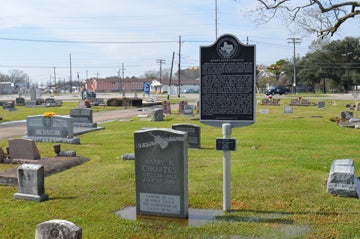Port Arthur musician had big impact on Cajun music
Published 5:38 pm Friday, January 20, 2017

- Though he lived a tragic life, Port Arthur resident Harry Henry Choates recorded some classic Cajun songs.
Though Harry Henry Choates was buried in a pauper’s grave when he died, he still made a huge impact on the Cajun music scene during his life, according to Sam Monroe, president of the Port Arthur Historical Society.
Choates is now buried at Calvary Cemetery at the corner of Ninth Avenue and 25th Street in Port Arthur where there is also a Texas State Historical marker in honor of him.
Amos Hebert, a former band mate, and his wife Jean drove from their home in Kaplan, Louisiana for the unveiling of the marker in 2007.
Hebert joined up with Choates for a nine-month stint when Choates’ famous rendition of “Jole Blon” was recorded.
Their short musical journey started in Corpus Christi, the steel guitar player said. Later, the band and Choates played gigs between Southwest Louisiana and Southeast Texas.
While Choates is famous for his fiddle playing, both Hebert and fellow bandmake R. A. Faulk said the musician was even more talented on the guitar. However, his talent could not save Choates, who died at 28, from an early death.
Local historian Yvonne Sutherlin likened his tragic life to that of Janis Joplin who died of an accidental overdose at age 27.
The marker was sponsored by the Port Arthur Historical Society, Jerry J. Bellot, Jeff Hayes, Tim Knight, Huey P. Meaux and Sam Monroe.
The text of the 2007 historical marker reads as follows:
Noted musician Harry Henry Choates, whose career was shortened by an early death, was born in Louisiana in 1922.
During the 1930s, he moved with his mother to Port Arthur, where as a child he began to develop and shape his gift of music. Known for playing the fiddle and singing in French and English, Choates also played the accordion, acoustic guitar and steel guitar. Choates helped raise Cajun music to national prominence during the 1940s.
While also performing jazz, blues and country, he was best known for merging traditional Cajun music with western swing.
In 1946, he organized a band named the Melody Boys and recorded “Jole Blon,” rewriting a traditional Cajun waltz, “Jolie Blone.”
“Jole Blon” became a regional favorite and received extensive airplay nationwide. It is still considered his enduring classic.
Choates and the Melody Boys recorded dozens of other songs in the next several years and, partly due to Choates’ famed, high-energy performances, became widely known. Unfortunately, difficulties in Choates’ personal life sometimes overshadowed his musical talent.
He often ignored contracts, which led to booking cancellations and ultimately the disbanding of the Melody Boys. He also battled alcoholism and was estranged from his wife, Helen, with whom he had two children.
Choates moved to Austin by the early 1950s, and police there detained him after a Jefferson County judge found him in contempt of court. In 1951, he died in the Travis County Jail, under uncertain circumstances.
Though his life was brief and sometimes tragic, he left a legacy of talent still celebrated today, influencing a new generation of musicians.
David Ball: 409-721-2427


